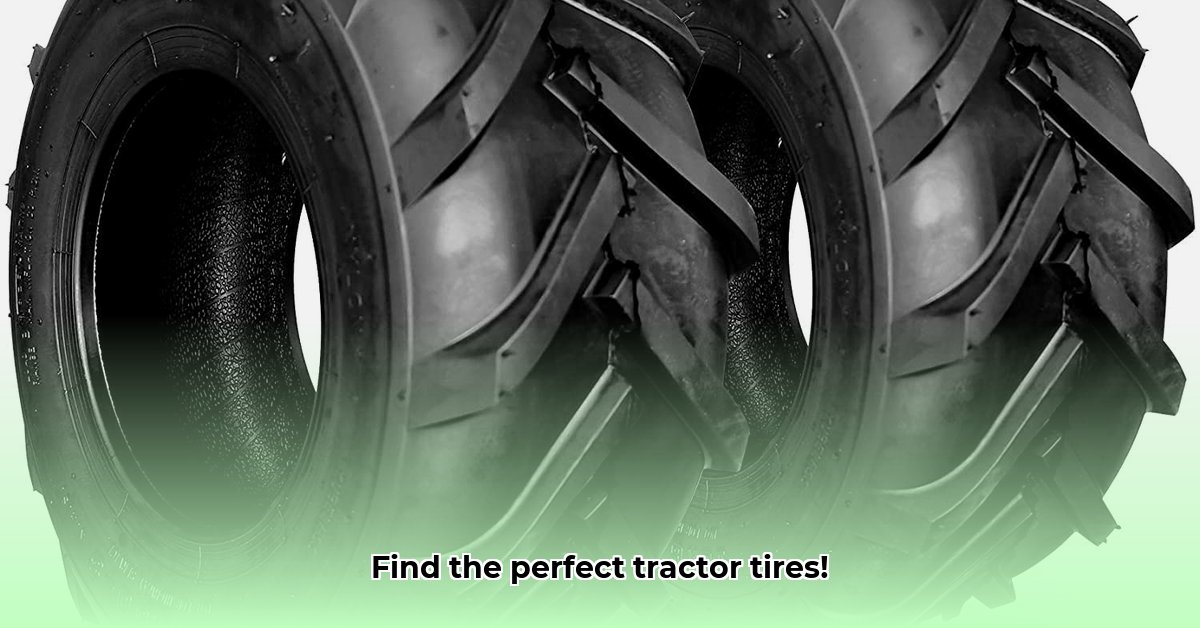
Choosing the right tires for your compact tractor is crucial for performance, longevity, and cost-effectiveness. This guide focuses on 5.00-12 tractor tires, helping you select the ideal option for your needs. For more on tractor tire sizes, see this helpful guide: tractor tire sizes. We'll explore key features, factors influencing your choice, and provide a step-by-step buying guide.
Understanding Key Features: Traction, Durability, and Load Capacity
Your tractor tires are its foundation. Just as you wouldn't wear hiking boots to a formal event, your tractor needs different tires for different tasks. Three primary features will guide your decision:
Traction: This refers to how well your tires grip the ground. Aggressive tread patterns with deep grooves excel in mud and loose soil, maximizing grip. Smoother treads, conversely, are better for paved surfaces or hard-packed earth. Consider your typical terrain—muddy fields demand aggressive treads, while well-maintained gardens may tolerate smoother ones. Do you frequently encounter challenging conditions? A rhetorical question to ponder.
Durability: This reflects the tire's resistance to wear and tear. Heavy-duty tires, often constructed with reinforced materials, withstand frequent use and harsh conditions. While more expensive upfront, these durable tires ultimately reduce replacement costs over time. How often do you use your tractor? Daily, heavy usage strongly favors a durable, high-quality tire. A quantifiable fact to note: High-quality tires can often last twice as long as cheaper alternatives.
Load Capacity: This specifies the maximum weight a tire can safely support. Overloading leads to premature wear, tire damage, and potential accidents. Always check your tractor's manual for weight recommendations and choose tires with a sufficient capacity margin. Do you regularly haul heavy loads? A higher load capacity is paramount for safety and tire longevity. This is a crucial aspect to consider before purchasing new tires.
Factors Affecting Tire Choice: Terrain, Workload, and Budget
Several factors will impact your tire selection. Let's analyze them:
Terrain: The type of ground you typically work on significantly influences tread pattern choice. Soft, muddy terrain necessitates deep, aggressive treads for optimal grip. Hard-packed soil or paved surfaces, however, favor smoother treads for better performance and reduced wear.
Workload: Intense, daily use demands durable tires capable of withstanding constant stress. Occasional use, on the other hand, may allow for a less robust, more budget-friendly option. Consider your tractor's typical workload; consistent heavy-duty operation warrants investment in a high-quality tire.
Budget: High-quality tires, though initially more expensive, offer superior durability and longevity, often leading to long-term cost savings. A balance between upfront cost and long-term value is essential. Consider the total cost of ownership—the initial price plus the cost of replacements over the tire's lifespan. This approach helps make an informed decision.
A Comparative Analysis: High-Quality vs. Lower-Cost Tires
Direct brand comparisons are challenging due to limited publicly available data. However, we can highlight key differences between higher and lower-quality tires.
| Feature | High-Quality Tire | Lower-Cost Tire |
|---|---|---|
| Construction | Robust sidewalls, heavy-duty materials | Lighter construction, potentially thinner sidewalls |
| Tread Pattern | Deep, aggressive tread for superior grip | Less aggressive tread, reduced traction |
| Load Capacity | Typically higher, ensuring safe handling of heavy loads | Lower, restricting maximum weight capacity |
| Expected Lifespan | Significantly longer, minimizing replacement costs | Shorter, necessitating frequent replacements |
| Price | Higher initial cost | Lower initial cost |
While a higher initial cost is typical for premium tires, remember the long-term savings from increased durability and longevity.
Your Step-by-Step Buying Guide: A Checklist for Success
Follow this step-by-step guide to select the perfect tires:
Measure Existing Tires: Accurately measure the width and diameter of your current tires using a tape measure. Ensure precision to avoid compatibility issues. (Accuracy is vital to prevent purchasing the wrong size.)
Verify Compatibility: Consult your tractor's owner's manual to confirm compatibility with the 5.00-12 size. Using incorrect tires can damage your tractor's drivetrain. (Ensure compatibility with your specific tractor model).
Check Load Ratings: Verify that the tire's load capacity meets or exceeds your tractor's requirements. Overloading is dangerous and shortens tire life. (Prioritize safety – this step is critically important).
Choose Reputable Suppliers: Select established retailers with positive reviews and a commitment to quality products and customer service. (Check online reviews before purchasing.)
Scrutinize Product Specifications: Carefully review construction, tread depth, load index, and other technical details before committing to a purchase. (A thorough review prevents unnecessary issues down the line).
Tire Maintenance: Extending Lifespan and Performance
Proper tire maintenance significantly improves lifespan and performance:
Maintain Correct Inflation: Regularly check and adjust tire pressure according to manufacturer recommendations. Incorrect inflation damages tires and reduces efficiency. (Regular checks are essential for optimal operation).
Regular Inspections: Frequently inspect tires for cuts, wear, and embedded objects. Address any issues early to prevent major damage. (Early detection is key to preventing costly repairs.)
By following these guidelines, you'll confidently choose the best 5.00-12 tractor tires for your specific needs, ensuring optimal performance and long-term cost savings. Prioritize safety above all else, and always consult your tractor's manual for specific recommendations.